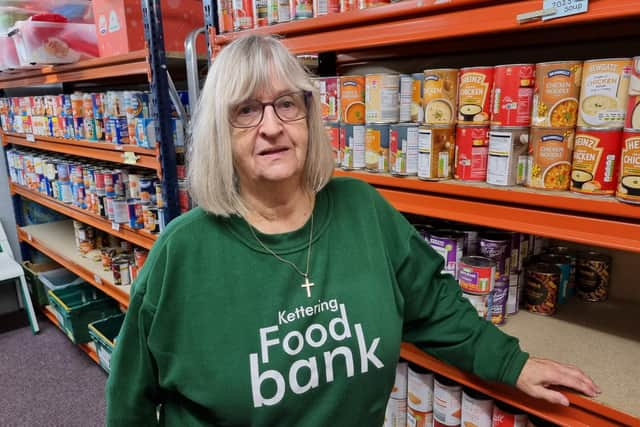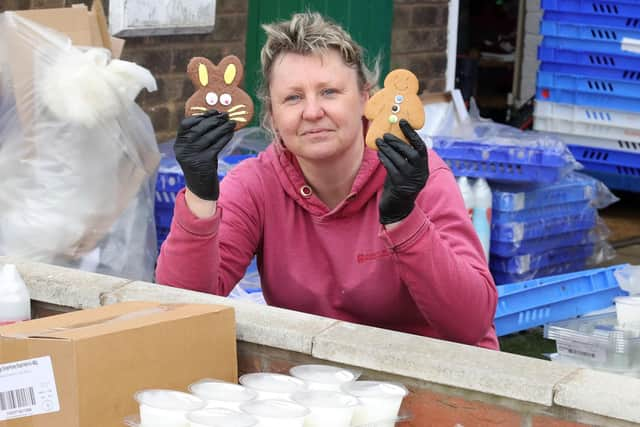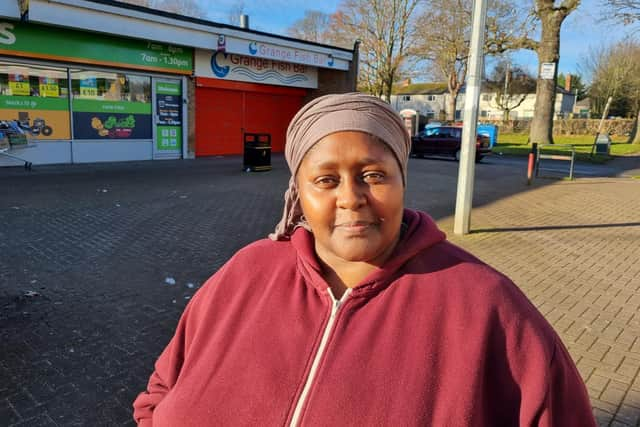'Children in this town are going without' - how heating or eating is affecting Kettering families
and live on Freeview channel 276
The rise in the cost of living is biting hard for people on the lowest incomes and with fuel bills set to soar people in Kettering are struggling to make ends meet.
Across the town some households have been having to make the difficult choice between eating or heating their homes with the voluntary sector helping out.
Advertisement
Hide AdAdvertisement
Hide AdFood banks and people handing out free meals are reporting that they have seen an increase in demand for services.


A Kettering mum-of-two who ran out of money to heat her Ise Lodge home has been helped by volunteers so her seven-year-old daughter can be warm.
She said: "It's plain rubbish at the moment. My partner was a key worker and he has depression and anxiety. We have been struggling. We have £375 a month after rent and are on Universal Credit.
"We are not putting the heating on. It's so hard, the only people who tend to help are the food bank. I have fallen behind on my bills. We have reached a low point"
Advertisement
Hide AdAdvertisement
Hide AdBefore Christmas the 37-year-old saved up £30 for her daughter's presents, her 19-year-old son had a token gift.


On Tuesday Kettering Food Bank paid for a top-up for their electricity meter.
She said: "I cried at the food bank - they are absolutely amazing. I literally ran out of heat. I've applied for a grant but it has taken longer than they said - the council said they couldn't do anything about it. It's hard we've had to go into bill debt - I owe £6,000.
"When my daughter is invited to parties we can't afford to go - we can't buy a present. We have a two-bedroom flat and she is sleeping in the living room. We have cordoned off a section for her. I don't know what's happening in the world. I hope things are going to get better.
Advertisement
Hide AdAdvertisement
Hide Ad"My son is going to uni next year and will never come back. He says Northamptonshire is depressing."
Today, latest official figures for December from the Office for National Statistics revealed that the cost of living rose at its fastest pace for nearly 30 years with the UK's Consumer Prices Index measure of inflation showing a rise to 5.4 per cent from 5.1 per cent in November. The last time inflation was higher was in March 1992, when it was 7.1 per cent.
Kelly Mercer, co-ordinator of Highfield Food Bank, works three jobs racking up 50 to 70 hours a week. She also volunteers on the Highfield estate helping hand out donations to families in need from the community centre.
During the pandemic she was on furlough and due to an error in how her wages were paid she has been left with a tax bill of £2,000 that she is paying off.
Advertisement
Hide AdAdvertisement
Hide AdShe said: "I'm paying £500 a month. I should have been paying tax on my furlough money but it wasn't taken off.


"I'm working all the hours. You would have thought if you were working you'd be OK. I spent £10 for two days' electricity. I pay on the meter so there's no horrible surprise. I wear jumpers. You have a choice to make - do I put the heating on or eat?"
"I know a lady who should be retiring but she can't afford to because she is £4 over the threshold for pension credits, so she has to struggle. It's crazy in this day and age that people who have worked all their lives, they can't afford to retire. People on benefits do need help but people on a low income need help too.
"This January has been the worst. Everything is going up. It's getting tougher and tougher. Working from home I need the heating on. Some days it is absolutely freezing. The cost has gone up. I can't wait for the spring."
Advertisement
Hide AdAdvertisement
Hide AdVolunteers at Grange Resource Centre have been providing hot meals and drinks as well as distributing free food as part of the Fair Share food project. Open on Tuesdays and Thursdays, the community hub is a warm safe space serving nutritious food.
Vanessa Ogbozor waitresses at the centre and also runs a women's group called Our Dignity.
The mum-of-one, who is on benefits, has seen her fuel bills rise dramatically.
She said: "It's a lot. What was £60 before, it's now doubled. They say that meters are better to budget. Once I pay the rent I'm struggling with the electricity and gas. You have to keep it ticking over. I have an 11-year-old and I'm constantly thinking about the electricity."
Advertisement
Hide AdAdvertisement
Hide AdDespite her money worries, she is more concerned about those who cannot claim benefits at all, including refugee families.
She said: "I'm worried for myself but I'm more worried about those other people. They are allowed to work but they can't claim benefits. The people in the most need don't come, people are very proud."
Another Grange estate resident, Craig, who has learning difficulties, comes regularly for help and advice to the resource centre - his flat has no fridge, cooker or washing machine.
The 49-year-old said: "I'm struggling to eat. I'm on the lower rate of PIP and Universal Credit. I have a key meter for the electricity and the gas. I pay it but I am in arrears with my council tax. I can't afford to make hot meals."
Advertisement
Hide AdAdvertisement
Hide AdJane Calcott from Kettering Foodbank and her team handed over 5,500 meals to needy people in December and she says she has seen the situation get worse in the 10 years they have been open.
She said: "It was getting worse long before Covid. Children in this town are going without. We have schools contact us because parents are facing a choice of food or clothing.
"I had a mum contact me. She had to buy a swimming costume for her child and a pair of shoes. He had just enough but she also had to choose heating or eating."
Money Saving Expert founder Martin Lewis has warned home owners to expect to take a 'seismic' hit to their bills this year as the government’s energy price cap is due to be revised in February, with the increase to be added to customers' bills from April.
Advertisement
Hide AdAdvertisement
Hide AdEarlier this month he said: "What’s coming in April is a seismic hit for fuel bills which is going to be astronomical."
Figures have revealed that there were 370 excess winter deaths in Northamptonshire between 2019 and 2020, excluding those from Covid-19, as calls for the UK Government to tackle the cold home crisis intensify.
The Excess Winter Mortality report from the Office for National Statistics shows that, across England and Wales as a whole, there were 29,290 excess deaths between December 2019 and March 2020, excluding Covid-19. Official figures for last winter (2020/21) have yet to be released.
Excess winter deaths are defined as the difference between the number of deaths recorded in the cold months (December to March) compared with the average number of deaths in the warmer four-month periods before (August to November) and after (April to July).
Advertisement
Hide AdAdvertisement
Hide AdLiving in cold temperatures can lead to high blood pressure and a weakened immune system, which puts older people in particular at greater risk of developing respiratory and cardiovascular disease alongside other seasonal illnesses. Public Health England suggest that over one-fifth of excess deaths during winter are directly linked to cold homes.
Malcolm Farrow from OFTEC, a leading trade association in the off-gas grid heating sector, said: “Experts believe that people who are older, live with long term health conditions or have lower average income are most at risk of winter illness or mortality. We have serious concerns that another cold winter, coupled with rising living costs and the ongoing risk posed by coronavirus, could make this situation much worse, as more households face a stark choice between heating and eating.”
In Northamptonshire, about 38,200 households are classed as 'fuel poor', which means their disposable income after energy costs puts them below the poverty line and their home has an energy efficiency (EPC) rating of band D or below.
Malcolm added: “Unfortunately, we know that many of those in Northamptonshire who are least able to afford their heating costs live in some of the most poorly insulated properties, making them much harder to heat and keep warm.
“The Government needs to take action and provide more support for fuel poor households to help tackle the excess winter death crisis we are facing."